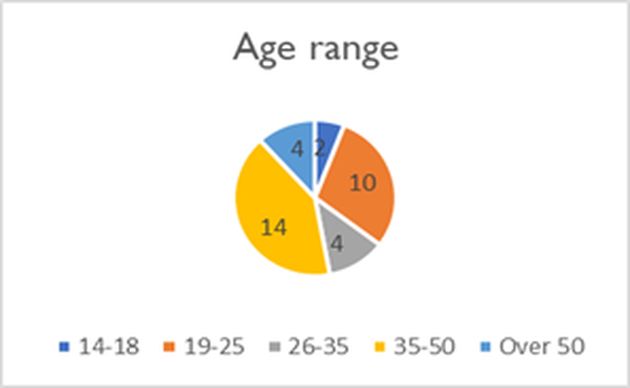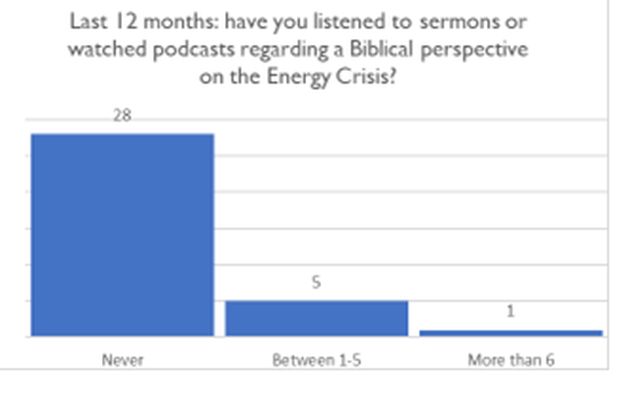Evangelical churches are more practical than reflective on pressing issues such as the energy crisis or the impact on the quality of life due to limited living resources.
![Photo: [link]Abby Anaday[/link], Unsplash CC0.](https://cms.evangelicalfocus.com/upload/imagenes/644b9a984457d_abbyanaday.jpg) Photo: [link]Abby Anaday[/link], Unsplash CC0.
Photo: [link]Abby Anaday[/link], Unsplash CC0.
A relatively small percentage of the general population in Central and Eastern Europe are part of the evangelical Church.
The percentage varies from 0.1% to 5%, with Poland and Greece at one end of the spectrum with less than 0.5% of evangelicals and Romania at the other end with about 5% (1) with the majority of the population being part of the Catholic or Orthodox Churches.
The energy crisis does not appear to be a central topic for evangelical churches. Brief research on evangelical social media found no published materials by evangelicals on this theme (2)
There are only a few articles written in the past years on related subjects such as global warming (3) or creation care (4).
As for the traditional churches the situation is comparable but with slightly more depth in Theology of ecology in academic published works (5)
To deepen the understanding of these findings, a quick survey was conducted among a proportion of evangelical population in Romania (the majority were university students in theological studies) which demonstrated an enormous void in speaking publicly about these subjects.
The survey was open for a 24 hour period using a Google form. In this graphic we can see the age range of the respondents, showing the majority are between 35 and 50 years of age.
As for their church membership, only one mentioned they are not part of an evangelical Church but we decided to keep the answers since this person in all probability studies in an evangelical school.

The question regarding sermons, podcasts and other social media materials on the subject of the evangelical biblical interpretation of the energy crisis had three potential answers: Never heard a sermon or encountered any audio or video on the subject; heard between 1 – 5 times; or over 6 times.
The graphic shows that an overwhelming majority had never encountered a presentation on the topic of the energy crisis during the past twelve months. This infers the subject is very rarely included in public presentations of evangelical Churches.

Moreover, when it comes to written texts and social media, 94% responded that they have never read an article or any written text on the subject whilst only 6% stated that they had consulted such material.
This short survey demonstrates that the evangelical church is not actively engaging with this subject in either sermons, on social media or in written press.
On a practical level, the involvement in the life of the community and the reaction to the disasters (war or more recently the earthquake in Turkey and Syria) is much greater.
For instance, many churches in Romania have turned their sanctuaries into dormitories to accommodate Ukrainian refugees.(6) Hungarian Baptist Aid quickly reacted to the needs of the victims of the earthquake and other churches from various European countries joined in.(7)
Evangelical churches all over Europe very quickly welcomed the refugees and were ready to respond to their needs.
Therefore, it appears that the evangelical churches are more practical than reflective on pressing issues such as the energy crisis or the impact on the quality of life due to limited living resources.
With such an approach, great help is provided to those in need showing a loving response to the present needs of people.
However, the biblical motivation needs to be understood and the wisdom of using the resources needs to be explained based on the Scripture.
The general population in Eastern Europe have been, economically speaking, in survival mode for many years. By now, most Central and Eastern Europeans are used to fluctuations of the local currency against Western money. (8)
Moreover, inflation has become a common problem with changes to the price of food and other daily essentials, causing frequent price oscillations and this has been part of everyday life for the last 30 years or so.
Corruption and financial instability are still reasons why people leave their own countries for Western countries for jobs and a better life.
Furthermore, local people have the perspective that external political powers are responsible (at least partially) for their misery and therefore actions should be mainly directed towards such interference.
Moreover, there is the perception that their past and current living conditions are at the discretion of more powerful nations which decides their fate.
This attitude of self-protection, and the blaming of other nations for the issues that negatively influence the quality of their lives, is characteristic of the current mentality of many Eastern European citizens.
Conversations with theological students, church workers and youth groups of evangelical churches, demonstrate that young people are fearful about the impact of the energy crisis but do not publicly talk about it whilst the older generation talk about it but do not engage in theological reflections on the topic.
Moreover, attitudes towards the energy crisis are formed through the resilience of a minimalistic lifestyle (living in cold houses; frequent power cuts; lack of food, etc.) and developed during communist times under Russian domination.
So this lifestyle becomes a coping mechanism as does resentment towards the nation(s) rather than a social issue with which the church should have the desire to theologically engage.
These listed limitations have been extrinsically imposed rather than internally desired as a consequence of a theological understanding of biblical values of creation care or loving the neighbour.
Since this article analyses the outcomes of research and does not provide a theological reflection of the subject, we will venture to conclude with a series of questions in the hope that this will ignite theological reflection and engagement with the subject of the local churches in their society.
Here are some potential questions:
What would happen if churches publicly addressed this crisis using biblical values?
Once the subject is acknowledged, what would be the response of the church to those impacted by it?
Are there biblical characters and examples that could be followed today by the churches? What would that look like in everyday life?
Alex Vlasin is currently serving as missionary with Barnabas International offering missionary training and member care, as well as being a visiting lecturer at the Baptist Theology Faculty, Bucharest University.
Vista is an online journal offering research-based information about mission in Europe. Founded in 2010, each themed edition covers a variety of perspectives on crucial issues for mission. Download the latest edition or read individual articles here. This article first appeared in the march 2023 edition of Vista Journal.
1. See Patrick Johnstone & Jason Mandryk: Operation World, 7th Edition, WEC int, 2010.
2. Online written social media in Romanian language. Search done in January – February 2023.
3. https://www.evanghelicreformat.org/blog/2021/8/31/este-incalzirea-globala-blestemul-lui-dumnezeu-prezis-in-apocalipsa, visited 9 Feb 2023.
4. https://alfaomega.tv/crestinulsisocietatea/stiinta-tech/12386-de-ce-sa-le-pese-crestinilor-de-mediul-inconjurator, visited 10 Feb 2023.
5. Daniel Munteanu: “Criterii dogmatice ale ecoteologiei ortodoxe” in Pe urmele iubirii, Ed Biblotheca, Targoviste, 2013, pp: 356-572.
6. https://ubc22.org/ and https://www.facebook.com/UBC22, visited 14 Feb 2023.
7. https://www.hbaid.org/hungarian-baptist-aid and https://international.hbaid.org/, visited 15 February 2023.
8. The majority of these countries still have their own currencies.

Las opiniones vertidas por nuestros colaboradores se realizan a nivel personal, pudiendo coincidir o no con la postura de la dirección de Protestante Digital.
Si quieres comentar o